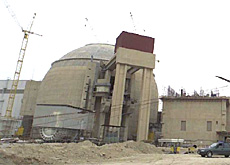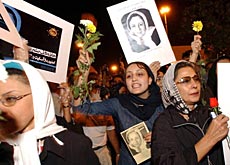Swiss expert fears Iran’s nuclear ambitions

A Swiss expert claims Iran does have a secret nuclear weapons programme and is in breach of the Nuclear Non-Proliferation Treaty (NPT).
As the International Atomic Energy Agency (IAEA) meets in Vienna to decide the matter, Christoph Wirz says Iran’s denials are simply not credible.
The nuclear specialist works at the Spiez Laboratory, the Swiss government’s nuclear, biological and chemical defence establishment.
Writing in the “Allgemeine Schweizerische Militärzeitschrift”, a Swiss military journal, Wirz questions why an oil and gas-rich country like Iran says its needs to generate nuclear energy for civil purposes.
He argues that there are clear indications that Iran is producing nuclear weapons: the presence of a civil nuclear programme without clear economic advantages, inadequate international supervision of nuclear facilities, and a missile programme.
And Iran’s justification that it wants to use less oil to produce electricity is questionable, says Wirz.
He argues that the country’s claims to want to protect the environment and to make money from selling “black gold” on the open market ring hollow, given that this is dependent on the dollar rate and the price of oil.
The Swiss expert also believes that a missile-producing nation is likely to have a military nuclear programme. Iran is one of the few states to have produced or tested missiles with a range of more than 1,000 kilometres.
Security
National security is likely to be a driving force behind any nuclear weapons programme, argues Wirz. Geographically the country sits close to nations that already have nuclear weapons at their disposal – Israel, Russia, China, India and Pakistan.
To date, the IAEA has not uncovered any conclusive proof that Iran has a secret nuclear weapons programme. At the beginning of this month, Teheran agreed increased inspections by the nuclear watchdog.
And on November 10, Iran informed the IAEA that it would sign the Additional Protocol to NPT, paving the way for inspections at short notice.
An IAEA spokeswoman told swissinfo that Iran’s decision to sign the protocol was a positive development.
While it could be months before Iran actually signs the agreement, the IAEA says this is not a cause for concern.
Sanctions
The United States has been pressing for Iran to be declared in breach of NPT, claiming Teheran has not been honest about acquiring materials that could be used to make nuclear weapons.
If the US gets its way, this could pave the way for sanctions to be imposed by the United Nations Security Council.
The Europeans, on the other hand, favour a more softly-softly approach and would be prepared to share civil nuclear technology with Teheran.
IAEA’s 35-member governing board is likely to decide the matter by the end of this week.
swissinfo, Faryal Mirza
The IAEA is a United Nations agency charged with safeguarding nuclear material and activities, under agreements with more than 140 States.
It is a guardian of the Nuclear Non-Proliferation Treaty, signed by 137 countries.
Iran ratified this treaty in 1970.
The Additional Protocol to the treaty gives the IAEA expanded rights of access to information and sites, including short-notice access to all buildings on a nuclear site.

In compliance with the JTI standards
More: SWI swissinfo.ch certified by the Journalism Trust Initiative

You can find an overview of ongoing debates with our journalists here. Please join us!
If you want to start a conversation about a topic raised in this article or want to report factual errors, email us at english@swissinfo.ch.